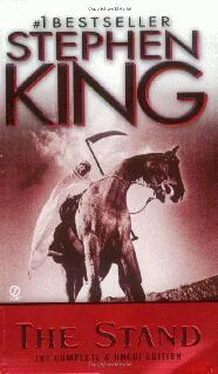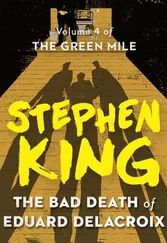“Keep well, Frannie, old kid,” he said, and got into his sleeping bag. And in his dreams he thought that Something had come near their camp, Something that was keeping malevolent watch over them. It might have been a wolf with human understanding. Or a crow. Or a weasel, creeping bellydown through the scrub. Or it might have been some disembodied presence, a watching Eye.
I will fear no evil , he muttered in his dream. Yea, though I walk though the valley of the shadow of death, I will fear no evil. No evil .
At last the dream faded and he slept soundly.
The next morning they were on the road again early, Larry’s gadget clicking off the miles as the highway switched lazily back and forth down the gentling Western Slope toward Utah. Shortly after noon they left Colorado behind them. That evening they camped west of Harley Dome, Utah. For the first time the great silence impressed then as being oppressive and malefic. Ralph Brentner went to sleep that night thinking: We’re in the West now. We’re out of our ballpark and into his .
And that night Ralph dreamed of a wolf with a single red eye that had come out of the badlands to watch them. Go away , Ralph told it. Go away, we’re not afraid. Not afraid of you .
By 2 P.M. on the afternoon of September 21, they were past Sego. The next large town, according to Stu’s pocket map, was Green River. There were no more towns after that for a long, long time. Then, as Ralph had said, they would probably find out if God was with them or not.
“Actually,” Larry said to Glen, “I’m not as worried about food as I am water. Most everyone who’s on a trip keeps a few munchies in their car, Oreos or Fig Newtons or something like that.”
Glen smiled. “Maybe the Lord will send us showers of blessing.”
Larry looked up at the cloudless blue sky and grimaced at the idea. “I sometimes think she was right off her block at the end of it.”
“Maybe she was,” Glen said mildly. “If you read your theology, you’ll find that God often chooses to speak through the dying and the insane. It even seems to me—here’s the closet Jesuit coming out—that there are good psychological reasons for it. A madman or a person on her deathbed is a human being with a drastically changed psyche. A healthy person might be apt to filter the divine message, to alter it with his or her own personality. In other words, a healthy person might make a shitty prophet.”
“The ways of God,” Larry said. “I know. We see through a glass darkly. It’s a pretty dark glass to me, all right. Why we’re walking all this way when we could have driven it in a week is beyond me. But since we’re doing a nutty thing, I guess it’s okay to do it in a nutty way.”
“What we’re doing has all sorts of historical precedent,” Glen said, “and I see some perfectly sound psychological and sociological reasons for this walk. I don’t know if they’re God’s reasons or not, but they make good sense to me.”
“Such as what?” Stu and Ralph had walked over to hear this, too.
“There were several American Indian tribes that used to make ‘having a vision’ an integral part of their manhood rite. When it was your time to become a man, you were supposed to go out into the wilderness unarmed. You were supposed to make a kill, and two songs—one about the Great Spirit and one about your own prowess as a hunter and a rider and a warrior and a fucker—and have that vision. You weren’t supposed to eat. You were supposed to get up high—mentally as well as physically—and wait for that vision to come. And eventually, of course, it would.” He chuckled. “Starvation is a great hallucinogenic.”
“You think Mother sent us out here to have visions?” Ralph asked.
“Maybe to gain strength and holiness by a purging process,” Glen said. “The casting away of things is symbolic, you know. Talismanic. When you cast away things , you’re also casting away the self-related others that are symbolically related to those things. You start a cleaning-out process. You begin to empty the vessel.”
Larry shook his head slowly. “I don’t follow that.”
“Well, take an intelligent pre-plague man. Break his TV, and what does he do at night?”
“Reads a book,” Ralph said.
“Goes to see his friends,” Stu said.
“Plays the stereo,” Larry said, grinning.
“Sure, all those things,” Glen said. “But he’s also missing that TV. There’s a hole in his life where that TV used to be. In the back of his mind he’s still thinking, At nine o’clock I’m going to pull a few beers and watch the Sox on the tube . And when he goes in there and sees that empty cabinet, he feels as disappointed as hell. A part of his accustomed life has been poured out, is it not so?”
“Yeah,” Ralph said. “Our TV went on the fritz once for two weeks and I didn’t feel right until it was back.”
“It makes a bigger hole in his life if he watched a lot of TV, a smaller hole if he only used it a little bit. But something is gone. Now take away all his books, all his friends, and his stereo. Also remove all sustenance except what he can glean along the way. It’s an emptying-out process and also a diminishing of the ego. Your selves , gentlemen—they are turning into a window-glass. Or better yet, empty tumblers.”
“But what’s the point?” Ralph asked. “Why go through all the rigmarole?”
Glen said, “If you read your Bible, you’ll see that it was pretty traditional for these prophets to go out into the wilderness from time to time—Old Testament Magical Mystery Tours. The timespan given for these jaunts was usually forty days and forty nights, a Hebraic idiom that really means ‘no one knows exactly how long he was gone, but it was quite a while.’ Does that remind you of anyone?”
“Sure. Mother,” Ralph said.
“Now think of yourself as a battery. You really are, you know. Your brain runs on chemically converted electrical current. For that matter, your muscles run on tiny charges, too—a chemical called acetylcholine allows the charge to pass when you need to move, and when you want to stop, another chemical, cholinesterase, is manufactured. Cholinesterase destroys acetylcholine, so your nerves become poor conductors again. Good thing, too. Otherwise, once you started scratching your nose, you’d never be able to stop. Okay, the point is this: Everything you think, everything you do, it all has to run off the battery. Like the accessories in a car.”
They were all listening closely.
“Watching TV, reading books, talking with friends, eating a big dinner… all of it runs off the battery. A normal life—at least in what used to be Western civilization—was like running a car with power windows, power brakes, power seats, all the goodies. But the more goodies you have, the less the battery can charge. True?”
“Yeah,” Ralph said. “Even a big Delco won’t ever overcharge when it’s sitting in a Cadillac.”
“Well, what we’ve done is to strip off the accessories. We’re on charge.”
Ralph said uneasily: “If you put a car battery on charge for too long, she’ll explode.”
“Yes,” Glen agreed. “Same with people. The Bible tells us about Isaiah and Job and the others, but it doesn’t say how many prophets came back from the wilderness with visions that had crisped their brains. I imagine there were some. But I have a healthy respect for human intelligence and the human psyche, in spite of an occasional throwback like East Texas here—”
“Off my case, baldy,” Stu growled.
“Anyhow, the capacity of the human mind is a lot bigger than the biggest Delco battery. I think it can take a charge almost to infinity. In certain cases, perhaps beyond infinity.”
Читать дальше












